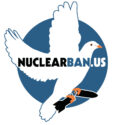“Treaty Compliance” means that you (as an individual, group, or local government) do the same things a country does when it signs the Treaty. You don’t have to wait for your federal government to comply with this international law — you can do it yourself, right now.
The Treaty on the Prohibition of Nuclear Weapons prohibits all research, development, testing, production, deployment, stockpiling, transfer, use and threat to use nuclear weapons. It also prohibits “assisting, encouraging or inducing in any way anyone to engage in any of these activities.”
That means it is prohibited under this Treaty to support or finance private companies – as well as government entities – involved in the nuclear weapons business. It means divesting from those banks and financial institutions which support and finance those companies. And it means naming and shaming all those companies and financial institutions until they remove themselves from the nuclear weapons business and also agree to comply with the Treaty.
None of this is easy, and it cannot be done overnight. That is why the Treaty spells out a very clear pathway to compliance. The first step toward Treaty Compliance (TC) is to establish a Treaty Compliance Commission (TCC) or other such body, officially tasked with the job of moving a city, town, county, state, school, business, etc. towards Treaty Compliance (In the case of existing Nuclear-Free Zones, there may already be a NFZ Committee in place that can serve in this capacity).
The first task of the TCC is to find out what, within the jurisdiction or control of the entity they represent, may need to be altered or addressed in order for that entity to become Treaty Compliant. This could involve public hearings, evidence gathering, desk research or whatever else is need to make an official Declaration (as per Article 2 of the Treaty) as to the elements within its jurisdiction or control that may be in violation of the Treaty.
The second task of the TCC is then to produce a Plan (as per Article 4 of the Treaty) which sets out exactly how the entity they represent can move to full (or partial) Treaty Compliance. In most cases, the Plan will involve:
- Divestment from an agreed list of financial institutions and companies known to be involved in, or financing, nuclear weapons-related work.
- Removal of any nuclear weapons-related work from taking place in the territory under its jurisdiction or control.
- Exclusion of nuclear weapons-related companies from the entity’s list of approved vendors.
- Prohibition of nuclear weapons-related products from entering or passing through the territory under its jurisdiction or control.
Once the TCC has produced a Plan for Treaty Compliance, it will be up to the entity involved to then legally implement the Plan and enforce it through fines or other sanctions. Many NFZ towns and cities have been doing this in relation to nuclear weapons-related work since the 1980s.
Treaty Compliance in the US context ultimately involves a form of certification, confirming that the said entity, town, city, county, state, etc. is indeed Treaty Compliant (as far as they are able to be within their jurisdiction or control).
Under the Treaty, it is the International Atomic Energy Agency (IAEA) who will ultimately monitor and certify that no nuclear weapons exist or are being developed in violation of the Treaty. It is all the countries who sign the Treaty, however, who hold each other accountable to the Treaty.
So in the case of Treaty Compliance within the United States, the aim will be to create a TCC at the national level, consisting of representatives chosen from the different Treaty Compliant entities as they become TC. This National Treaty Compliance Commission (NTCC) would be responsible for officially certifying that entities within the US have successfully gone through the stages of Treaty Compliance listed above and have attained the status of being either fully or partially TC.
Fully Treaty Compliant means that, were that entity a sovereign state, it would be eligible to sign the Treaty. Partially Treaty Compliant means that there still remain, within its territory although not under its jurisdiction or control, nuclear weapons at military bases or nuclear weapons-related facilities operated by or for the federal government. These entities cannot therefore be fully TC until such time as the US government is itself TC (and thus a signatory to the Treaty).
Full or Partial Certification applies to local and state governments, but all other non-governmental entities wishing to be Treaty Compliant would simply ‘self-certify’ as being TC. There could be forms of official certification at this level if, for instance, a consortium of colleges, or a business sector, or some other national or state grouping wished to certify each other.
